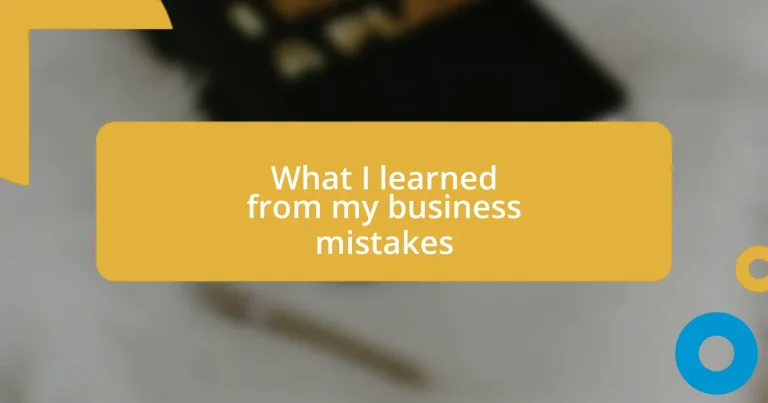Key takeaways:
- Business mistakes often stem from poor planning, impulsive decisions, and failure to adapt to market changes.
- Learning from mistakes is essential for personal and professional growth, fostering resilience, and encouraging innovation within teams.
- Common mistakes to avoid include neglecting market research, ignoring feedback, and inadequate training, alongside strategies like radical transparency and collective learning for future improvement.
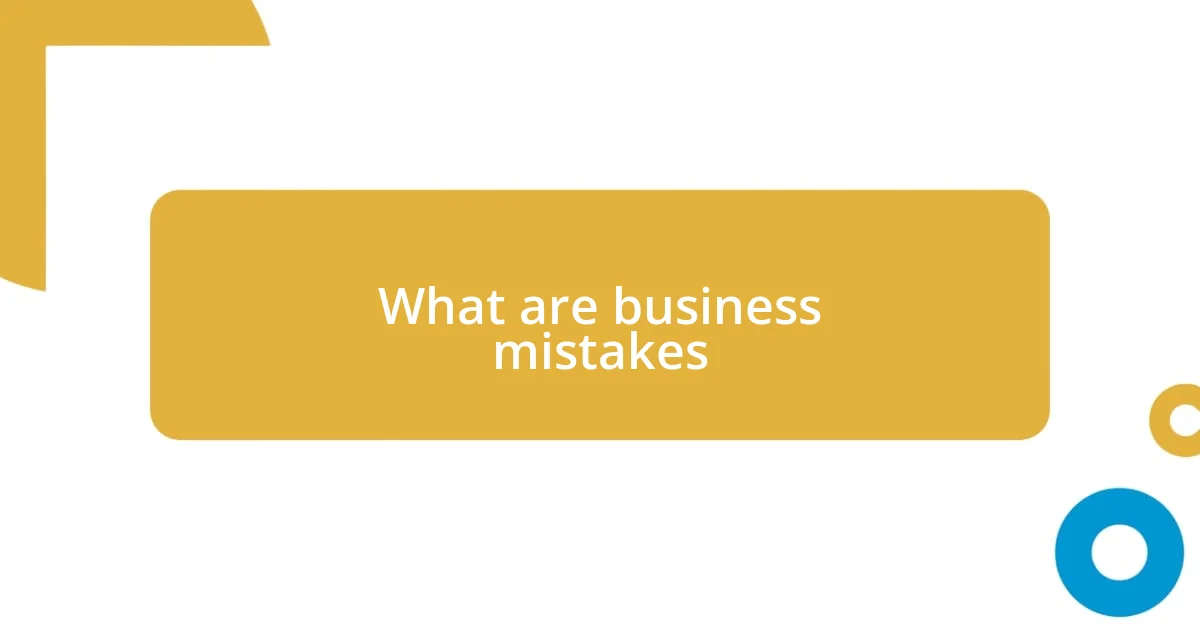
What are business mistakes
Business mistakes are often the missteps that arise from poor planning, oversight, or a lack of knowledge. I remember once being dazzled by a flashy marketing campaign without thoroughly analyzing my target audience. It wasn’t until I saw low engagement numbers that I realized I had completely missed the mark—has that ever happened to you?
At times, these blunders stem from impulsive decisions made in the heat of the moment. I’ve jumped at a partnership opportunity that seemed fantastic on paper, only to find out later that our values didn’t align. It made me wonder, how often do we rush into agreements without considering the long-term implications?
Some mistakes are surprisingly subtle, manifesting as a failure to adapt to changing market conditions. I learned this the hard way when a once-popular product of mine fell out of favor, and I didn’t pivot quickly enough. It taught me an important lesson: are we truly listening to our customers and evolving with their needs?
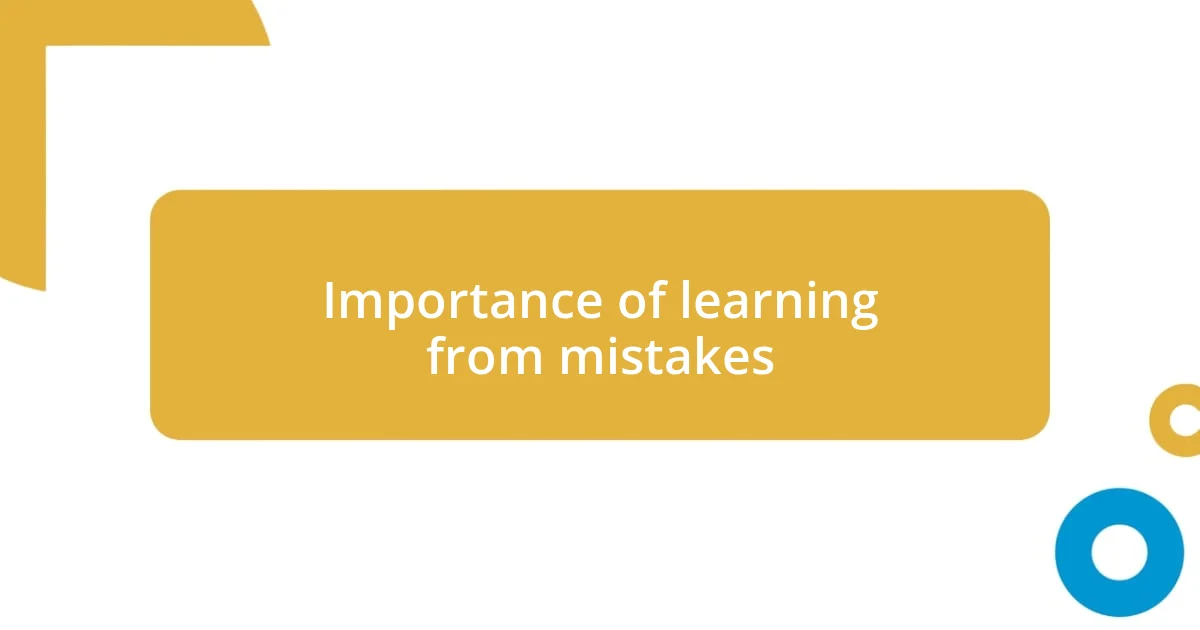
Importance of learning from mistakes
Learning from mistakes is essential for growth, both personally and professionally. I distinctly remember the time I launched a product without sufficient testing. The backlash was swift, and it taught me that every failure has a lesson embedded within it. Navigating through the aftermath was tough, but it ultimately made my business stronger.
Mistakes can often feel like setbacks, yet they are invaluable opportunities for reflection. After a project I invested heavily in flopped, I found myself questioning my strategies and assumptions. Through this process, I embraced a mindset of continuous improvement, recognizing that it’s not about avoiding mistakes but rather how we respond to them that defines our path forward.
Moreover, cultivating a culture that encourages learning from missteps fosters resilience. I realized that transparent discussions about failures among my team created an environment where innovation thrived. Embracing vulnerabilities allowed us to collaborate better and make more informed decisions, ultimately leading to a stronger foundation for our company.
| Aspect | Learning from Mistakes |
|---|---|
| Opportunity for Growth | Each mistake can serve as a stepping stone toward improvement. |
| Building Resilience | Learning to bounce back from failures cultivates strength. |
| Encouraging Team Dynamics | Sharing experiences leads to a collaborative and innovative work environment. |
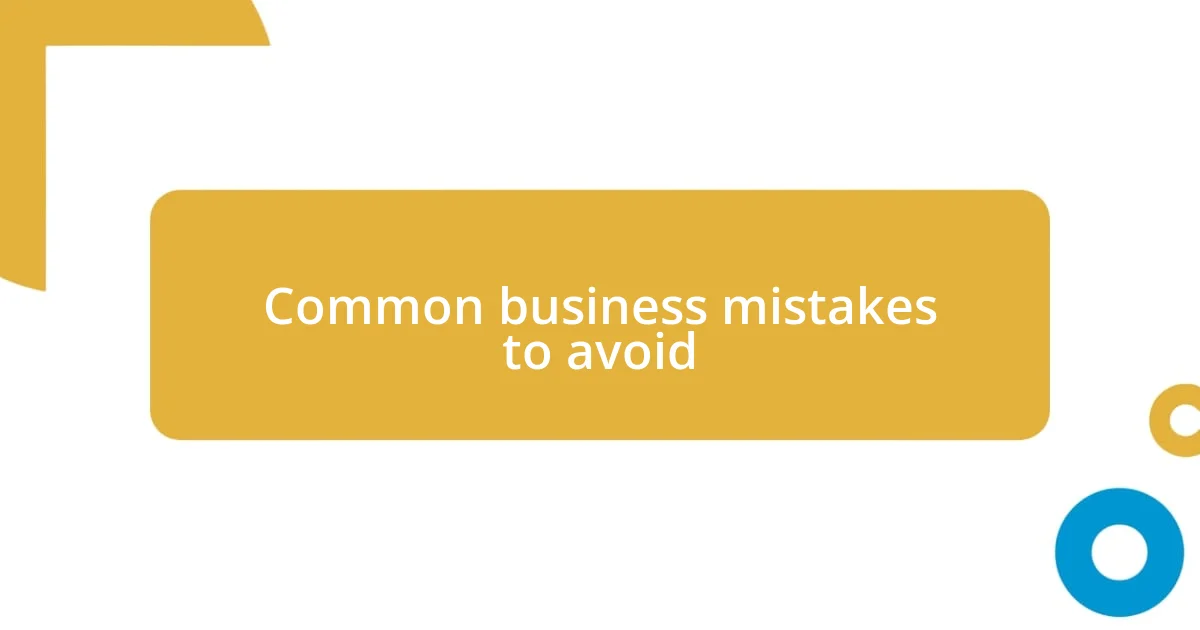
Common business mistakes to avoid
Identifying common mistakes in business can be incredibly enlightening. I’ve found that overlooking financial forecasting can lead to cash flow crises. When I underestimated expenses in my early days, it felt like the ground was pulled from beneath me. Such moments are painful but crucial for building a solid foundation in the long run.
In my experience, here are some common business mistakes to avoid:
- Neglecting Market Research: I once launched a service without fully understanding my competition, leading to disappointing results.
- Ignoring Feedback: Dismissing customer complaints turned out to be a misstep—listen to your audience!
- Overextending Resources: Too many products at once diluted focus; I learned that less can be more.
- Failure to Network: I didn’t prioritize building relationships early on, which limited valuable opportunities.
- Inadequate Training: I ignored staff development, and it backfired. Investing time in your team pays dividends later.
Each of these lessons carries its own weight and showcases how crucial it is to remain vigilant and adaptive in the ever-changing business landscape.
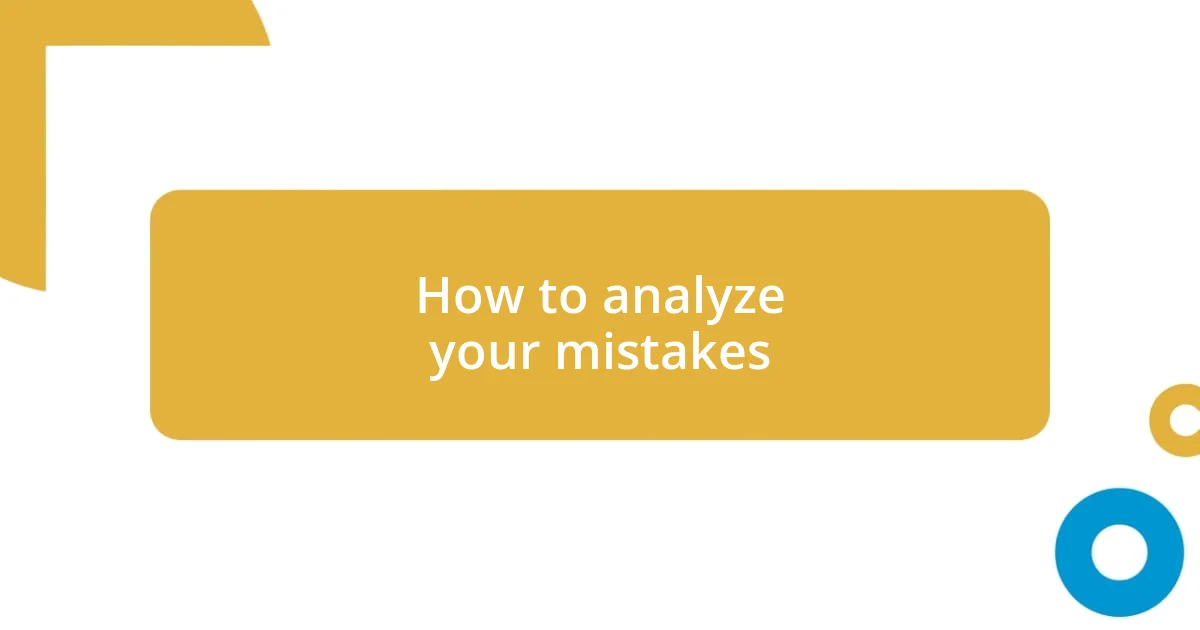
How to analyze your mistakes
When it comes to analyzing your mistakes, I find it helpful to take a step back and assess the situation objectively. There was a time when I questioned if my initial approach to a failed marketing campaign had been emotionally driven—perhaps out of excitement rather than logic. Reflecting on my decisions with a clear mind enabled me to pinpoint the moments where my intuition may have clouded my judgment.
It’s equally important to document your mistakes and the lessons learned. I once kept a journal of my entrepreneurial journey, and when I flipped back through it during tough times, I was astounded by how many invaluable lessons were neatly recorded. This practice not only solidified my learning process but served as a reminder that growth often rises from the ashes of setbacks. Have you ever considered how keeping track of your experiences might illuminate patterns you hadn’t noticed before?
Finally, engaging with others can provide external perspectives that you may overlook. I vividly recall a lunch meeting with a mentor who pointed out blind spots in my decision-making process regarding resource allocation. Listening to someone else’s input helped me see my mistake in a new light and fueled my desire to fine-tune my strategy moving forward. It makes me wonder—how often do we intentionally seek out feedback to improve our understanding? Embracing that dialogue can transform the way you perceive your failures and drive you toward future success.
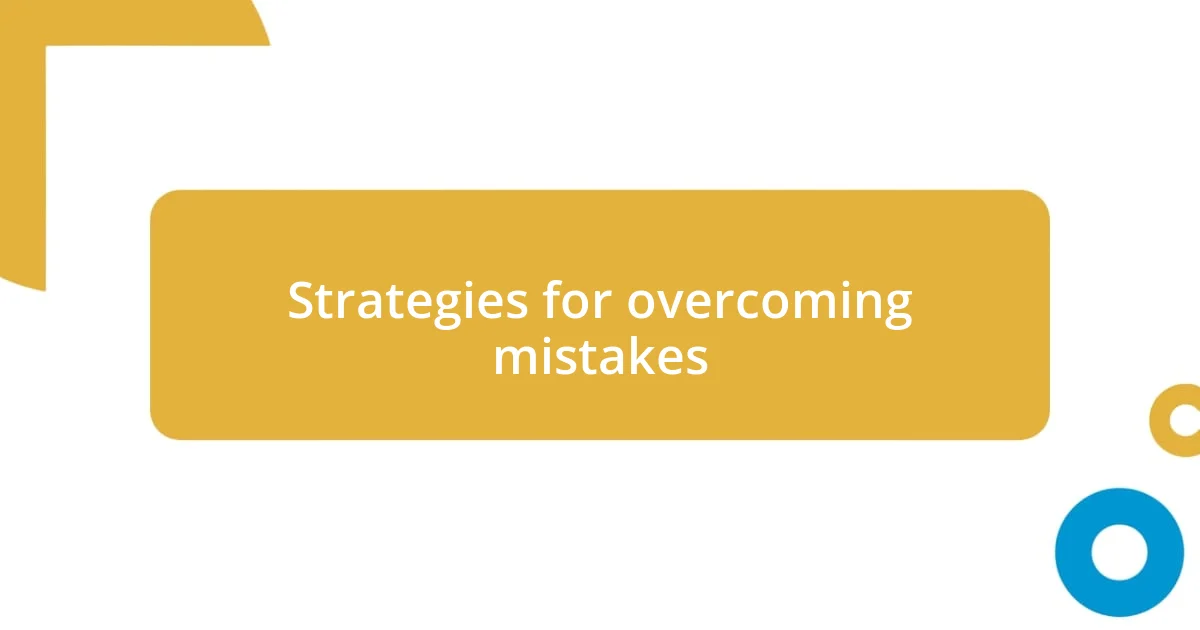
Strategies for overcoming mistakes
One of the most effective strategies I’ve discovered for overcoming mistakes is to practice radical transparency within my team. I recall a particular instance where I mismanaged a project timeline, which led to frustrated clients. Instead of hiding this blunder, I decided to openly discuss what went wrong with my team. This not only fostered a culture of trust but also encouraged everyone to share their own slip-ups, leading to collective learning. Have you ever wondered how openness can transform your workplace dynamics?
Another tactic that has worked wonders for me is creating a “lessons learned” session after completing major projects or campaigns. After a challenging product launch, I gathered my team to dissect what went awry and what went right. It was amazing to witness how discussing failures together provided a collective wisdom that transformed our approach for future endeavors. I’ve found that these moments can turn frustration into motivation, and I can’t help but think about how powerful group synergy can be in turning setbacks into stepping stones.
Lastly, I firmly believe in setting aside time for self-reflection. A few months ago, after facing a significant setback, I dedicated an afternoon to just sit with my thoughts and revisit my decisions. This practice not only cleared my mind but also unveiled underlying fears that had hindered my decision-making. How often do we pause long enough to listen to our inner thoughts? It’s in those quiet moments where genuine insights often dwell, ready to guide us toward improvement.
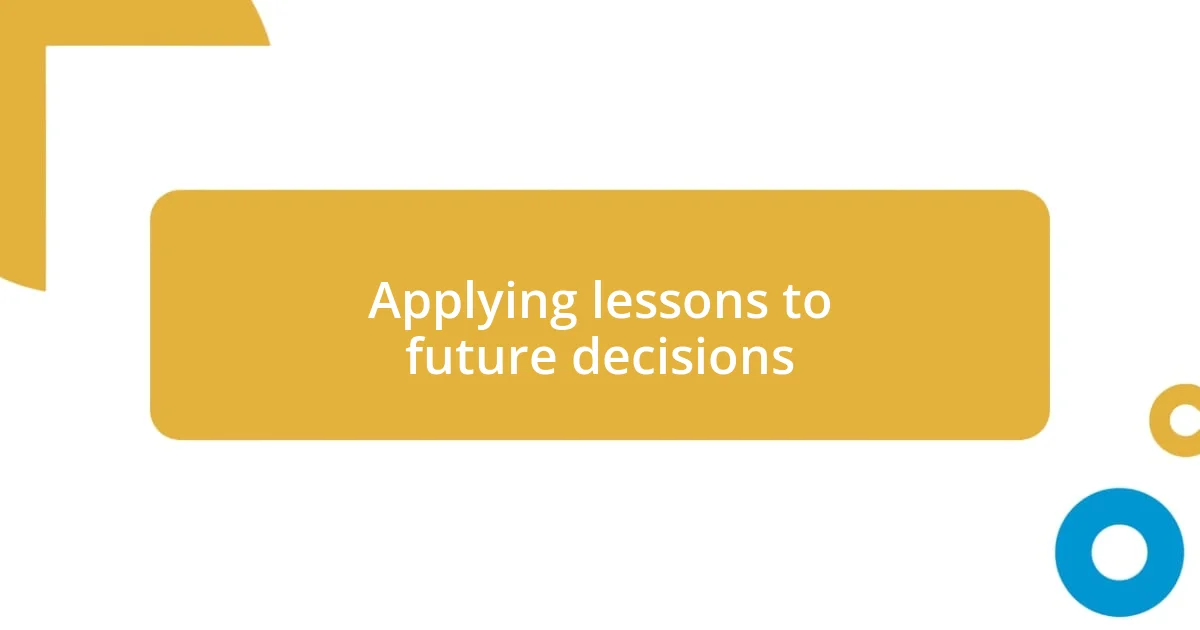
Applying lessons to future decisions
One way I’ve applied lessons from my mistakes in future decisions is by actively revisiting past projects that didn’t go as planned. I vividly remember a time when I launched a service without fully understanding my target audience’s needs. Now, I make it a point to create a comprehensive profile of my audience before diving into any new venture. Isn’t it interesting how a single oversight can reshape your entire strategy?
Another critical lesson is the importance of agility. I once invested heavily in a marketing channel that showed promise but didn’t deliver the expected results. After evaluating that situation, I adopted a more flexible approach, allowing me to pivot swiftly when something wasn’t working. Have you experienced the discomfort of sticking to a plan that isn’t serving you? Embracing change isn’t just a necessity; it’s a vital approach to thriving in a dynamic business environment.
Lastly, I regularly check in with my team to encourage a collective approach to learning from our missteps. During one team retrospective, we candidly discussed a failed product feature. That discussion not only brought healing but also sparked a renewed sense of collaboration moving forward. It made me wonder—how often do we create safe spaces for sharing lessons learned? The value of these discussions can profoundly influence decision-making in the future.
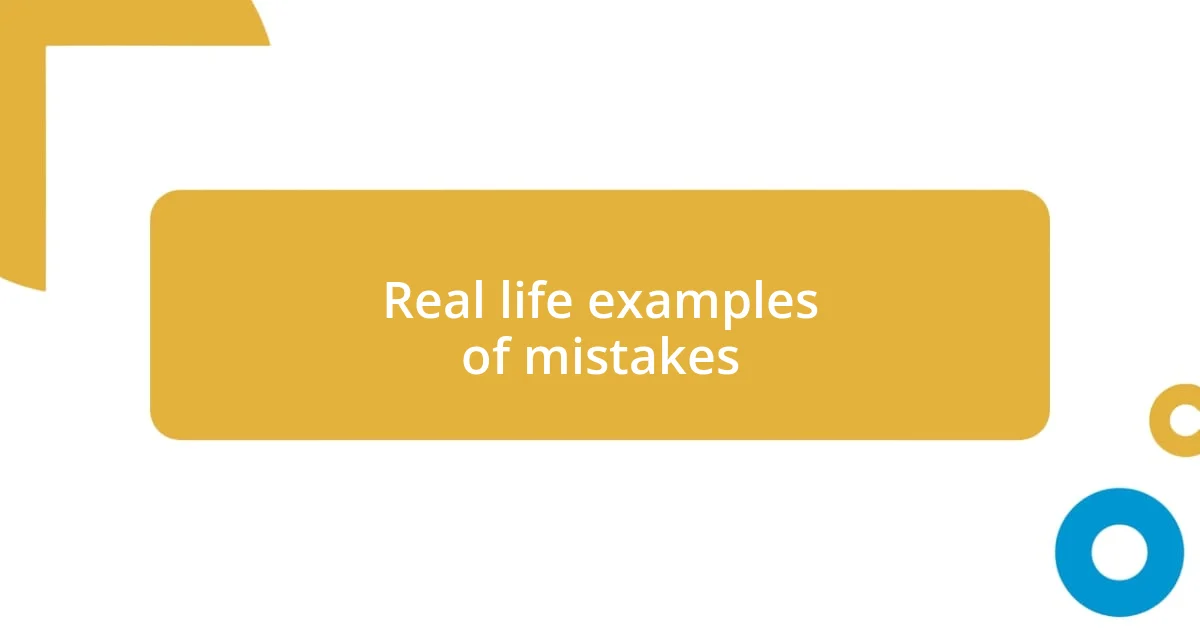
Real life examples of mistakes
I’ve learned some of my most valuable lessons through missteps that seemed daunting at the time. For instance, there was a project where I decided to cut corners on research, thinking I could save time. In the end, my team and I ended up redoing much of the work. Reflecting on this, I realized the importance of thorough groundwork. Have you ever felt the pressure to rush, only to discover it backfired?
Another significant mistake I made was in neglecting proper communication with my clients. Once, a client was left in the dark about project updates, which caused a rift in our relationship. That experience taught me that transparency isn’t just an internal matter; it’s essential for maintaining trust with clients too. How often do we forget that our clients are partners in the journey, deserving of updates and insights?
I also remember a time when I was overly optimistic about a new product launch. I was convinced everyone would love it, but the market response was lackluster. It was a tough pill to swallow, but this taught me the value of market validation. Now, I make it a priority to engage potential customers early in the process. Can you relate to the challenge of staying grounded in excitement while still being realistic? It’s a balance I strive for every day.












